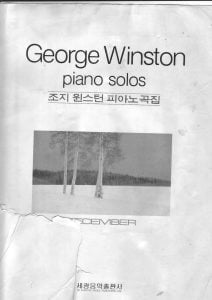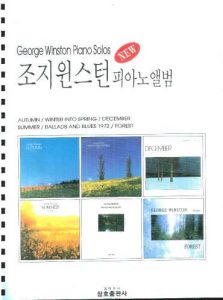Table of Contents
Remembering George Winston, born on this day in 1949 (1949-2023).
Come join us now, and enjoy playing your beloved music and browse through great scores of every level and styles!
Can’t find the songbook you’re looking for? Please, email us at: sheetmusiclibrarypdf@gmail.com We’d like to help you!
Who was George Winston?
George Otis Winston III (February 11, 1949 – June 4, 2023), most known as George Winston, was an American pianist performing contemporary instrumental music. Best known for his solo piano recordings, George Winston released his first album in 1972, and came to prominence with his 1980 album Autumn, which was followed in 1982 by Winter into Spring and December. All three became platinum-selling albums, with December becoming a triple-platinum album. A total of 16 solo albums were released, accumulating over 15 million records sold, with the 1994 album Forest earning Winston a Grammy Award for Best New Age Album.
George Winston received four other Grammy nominations, including one for Best Children’s Music Album, performed with actress Meryl Streep, and another for Best Contemporary Instrumental Album for his interpretation of works by the rock band the Doors.
Winston played in three styles: the melodic approach that he developed and called “rural folk piano”; stride piano, primarily inspired by Fats Waller and Teddy Wilson; and his primary interest, New Orleans rhythm and blues (R&B) piano, influenced by James Booker, Professor Longhair and Henry Butler. While the majority of his recordings were in the folk piano style, Winston mostly enjoyed playing R&B piano.

Best Sheet Music download from our Library.
His musical style has been classified as new age and sometimes classical, but he rejected both labels.

Winston also played the guitar and harmonica. His interest in the Hawaiian slack-key guitar led him to start his own record label, Dancing Cat Records.

Please, subscribe to our Library.
If you are already a subscriber, please, check our NEW SCORES’ page every month for new sheet music. THANK YOU!
George Winston’s Solo piano works
Winston was first recorded by John Fahey for Fahey’s Takoma Records. His debut album Piano Solos disappeared without much notice, although it was later reissued on Windham Hill Records under the title Ballads and Blues 1972.
In 1979, Winston sent a demo tape to William Ackerman, who had started his new record label, Windham Hill, in 1976. Ackerman offered to produce his next album, which became Autumn; it was soon the best-selling record in the label’s catalog.

Both Autumn and the following album Winter into Spring went platinum, signifying million-plus shipment in the United States. The Christmas album December became an even greater success, and it was certified triple platinum for shipment of three million.
On the heels of his three successful albums, Winston composed the score to accompany Meryl Streep’s narration on The Velveteen Rabbit in 1984, earning a Grammy nomination for Best Children’s Music Album. At the request of producer Lee Mendelson in 1988, he provided the music for the TV miniseries This Is America, Charlie Brown, which Winston considered a highlight of his career.
At the 38th Annual Grammy Awards in 1996, Winston won the award for Best New Age Album for Forest. Two of his other works, Plains (1999) and Montana: A Love Story (2004), were also later nominated for best new age album.
Winston released two albums of Guaraldi’s music. In 1996, he released Linus and Lucy: The Music of Vince Guaraldi, primarily devoted to the theme music Guaraldi wrote for the Peanuts cartoons: fifteen television specials and one feature film, ranging from 1965 until Guaraldi’s death in 1976. “I love his melodies and his chord progressions”, Winston said of Guaraldi. “He has a really personal way of doing voicings.” Winston recorded a follow-up album in 2020, Love Will Come: The Music of Vince Guaraldi, Volume 2.
In 2022, he was planning a third volume, Count the Ways: The Music of Vince Guaraldi Volume 3.
Winston’s 2002 album Night Divides the Day – The Music of the Doors consists of solo piano renditions of music by the rock band the Doors. The title of the album is a lyric from the band’s song “Break on Through (To the Other Side)”.[19] The album received a Grammy nomination for Best Contemporary Instrumental Album.[
George Winston suffered from a number of illnesses, and while recuperating from a bout of cancer in 2013, he played the piano in the medical center auditorium, creating 21 pieces, that he says were “kind of circular” and “minimalist”. In 2014, he included three of the pieces in a Spring Carousel EP, and a 15-track album, called Spring Carousel: A Cancer Research Benefit released on March 31. Proceeds benefit City of Hope Hospital near Los Angeles, where he was treated and subsequently composed the musical work.
On May 3, 2019, Winston released his 15th solo piano album, Restless Wind. The 11-song collection includes his interpretations of music by Sam Cooke, The Doors, Stephen Stills, George and Ira Gershwin, Country Joe McDonald, among others. “By virtue of his boundless imagination, Winston’s musical portrayals provide new textures and tones that illuminate the original compositions while discovering fresh insights and common musical themes”, wrote Jazziz about Restless Wind.
To kick off the release, Winston performed a concert at Pittsburgh’s Carnegie of Homestead Music Hall that benefited the Creative Arts Program, which provides scholarships to pay for music therapy. The album debuted at No. 1 on the Billboard New Age Charts, and No. 2 on the Billboard Jazz Charts.
In July 2019, at the National Music Council’s 2019 American Eagle Award Honor ceremony that recognized Vince Guaraldi, Winston performed his versions of the musician’s work.
From his grand piano, George Winston told the audience:
I love Vince's piano playing, and I love his compositions. I play way more of his songs than by any other composer. I first heard him in 1962, with "Cast Your Fate to the Wind"....And then in December 1965, I was a fan of animation, and I saw in the TV Guide that there was going to be a cartoon of the Peanuts characters, A Charlie Brown Christmas. And I thought, wow, I've got to see that. A lot of us remember where we were, the first time we heard "Linus and Lucy" in that special, during the dance segment.... Vince's piano just drove me crazy. And I went to the record store the next day—just to go to the record store—and there was the Charlie Brown Christmas soundtrack, up on the wall. And I looked at it, and thought, Oh, Vince Guaraldi, the "Cast Your Fate" guy. The TV episode credits had run by so fast, I hadn't seen it was Vince Guaraldi. So I got the album, and found "Linus and Lucy", and played it about 100 times on my record player.In 1983, Winston started his own label, Dancing Cat Records, which released his albums, with distribution by Windham Hill until the mid-2000s and subsequently by RCA. He primarily launched the label to record artists playing the Hawaiian slack-key guitar, which he admired.
Musical Style
Many of Winston’s melodic pieces were self-described as “rural folk piano” or “folk piano”, a style he developed in 1971 to complement the up-tempo stride piano he had been inspired to play by Fats Waller’s recordings from the 1920s and 1930s. These melodic pieces evoked the essence of a season and reflect natural landscapes.
The third style he played was New Orleans R&B piano, influenced mainly by James Booker, Professor Longhair, Henry Butler, as well as Dr. John and Jon Cleary. He had been called the “Father of New Age” because his album Autumn was released by Windham Hill Records, often described as a new age label; Winston himself denied that his music was new age.
On April 19, 2010, he appeared as the sole guest on show 575 of the multimedia WoodSongs Old-Time Radio Hour. Twenty minutes into the program, he described an unusual method of playing the piano with muted strings, a development inspired by watching blues guitar players. He can be seen reaching into the piano with his left hand and muting the strings, while with his right hand he is playing “An African in the Americas”.
Discography (on Wikipedia)
NOTES FROM GEORGE WINSTON
These are exact transcriptions of 20 songs from my albums, with chord labels included. One should feel free to interpret and change them however they want-I do that with all songs that I play.
(These transcribed versions are just the way the songs were played on the days that I recorded them). I learn music by ear, and I use chords and music theory to learn and remember music (see facing page).
One of the reasons I play the piano is that I prefer the quality of the sustain that the piano has over strings or organ, etc. I often use the sustain pedal for extended time periods, so sometimes some of the notes will sound like they are struck-but what is actually happening is that when the pedal is held down for a while, the overtones will sometimes swell and sound like a softly struck note. In this book, these types of sustained notes are indicated with a tie. You could strike those notes if you prefer to.
The other reason I play the piano is because it has power and volume, and because it is possible to play a lot of songs with multiple parts as solo instrumentals, which is my temperament as a musician. I mainly think of the piano as if it is an Afro-American tuned drum.
George Winston -December -1982 -FULL ALBUM.
Browse in the Library:
Or browse in the categories menus & download the Library Catalog PDF:
